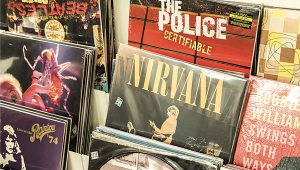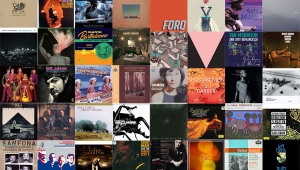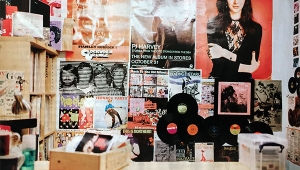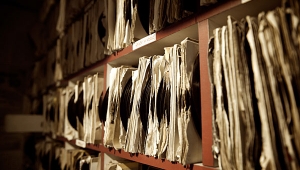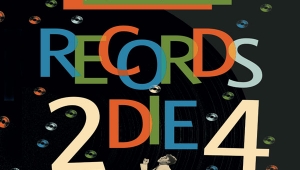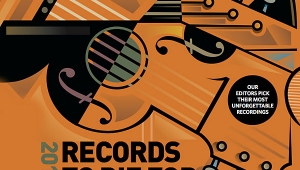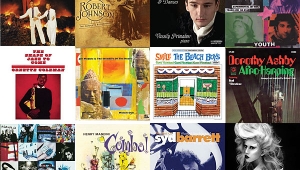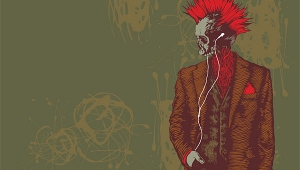| Columns Retired Columns & Blogs |
2002 Records To Die For Page 8
Wes Phillips
BOULEZ: Notations VII
DEBUSSY: La Mer
STRAVINSKY: Le Sacre du Printemps
Daniel Barenboim, Chicago Symphony Orchestra
Teldec 8573 81702-2 (CD). year?. Christoph Classen, prod.; Michael Bamann, eng. DDD. TT: 66:65
The Stravinsky and Debussy are absolute showstoppers, featuring impassioned playing and top-of-the-heap interpretations. All three works feature demonstration-quality sound with taut, muscular bass response and U-R-There sonic realism. This is the record they should have called The Power of the Orchestra. And if you think your system has good bottom end, this is the record that'll show it off or break it.
SHAVER: Tramp on Your Street
Rock The House RTH-11063 (LP), Praxis/Zoo/BMG 11063-2 (CD). 1995. R.S. Field, prod., eng.; Scott Baggett, eng. AAA/AAD? TTs: 42:17/48:22
Electrified (literally) by the presence of his son, Eddy, formerly of the Dwight Yoakam band, Billy Joe Shaver's songs never sounded tougher or more riveting than on this album. As always, the songs speak of hard living and salvation, but Eddy's slashing Stratocaster is what sparks the fiery interpretations that make Tramp so different from Billy Joe's earlier work. We fans knew the man was tough—he lost two fingers to his sawmill day job and just kept on going. And we knew he could write—singers have been fighting to perform his songs for over a decade. But nobody knew he could rock like this!
MARK ELF: Swingin'
Mark Elf, guitar; Aaron Goldberg, piano; Robert Hurst, bass; Winard Harper, drums
Jen Bay JBR 0008 (CD). 2001. Mark Elf, prod.; Michael Brorby, eng. DDD? TT: 57:41
Looking for an interesting new jazz guitar voice without wanting to choose among avant/crossover types, bland pop fusion, and competent traditionalists forced to belt out standards by overly conservative and myopic record-company moguls? Look no further than New York's Mark Elf. Elf has taken a big risk with his music; having no major-label support, he manages and funds all recordings, tours, and promotions himself. His aggressive marketing has paid off—his self-produced recordings get frequent airplay in oddball corners of the US not known for big jazz audiences. Elf is a first-rate guitarist in the bebop tradition, and his latest offers a variety of tasty tunes in solo, trio, and quartet formats. Best of all, unlike major-label stars, Elf is able to fill his CDs mostly with his own compositions, and he's an even better writer than he is a player. His pieces here outshine the far-from-shabby Coltrane, Kern, and Porter tunes also included. The sound quality is about as natural as one can get for this genre.
MICHAEL HARRISON: From Ancient Worlds
Michael Harrison, piano
New Albion NA042CD (CD). 1992. Michael Harrison, Stephen Scott, prods.; Tom Lazarus, eng. DDD? TT: 62:46
Fans of minimalist composer LaMonte Young's master opus, The Well-Tuned Piano, for solo piano in just intonation, should check out Michael Harrison. The beauty of piano music written in just intonation is the soothing and involving consonance of the timbres, which is not possible using the traditional but compromised equal-tempered tuning system developed during Bach's time. The downside of the just system is the inability to play music in more than one key. Composer Harrison, Young's disciple, has transcended this limitation by developing a unique piano with two sets of dampers and strings. The result is an instrument capable of playing 24 notes per octave, which effectively enables one to perform works in just intonation with the ability to change keys. From Ancient Worlds, the first music written for this piano, extends the music developed by Young to create an enticing, shimmering work. You get the best of both worlds: the delectable just-tuned piano sound with the ability of harmonic motion found in traditional classical works. The sound is to New Albion's usual impeccably high standard.
MAJOR LANCE
Everybody Loves a Good Time! The Best of Major Lance
Epic/Legacy EK 66988 (2 CDs). 1995. Bob Irwin, compilation prod. AAD? TT: 95:54
Major Lance's Greatest Hits
Okeh OKM 12110 (mono LP). 1965. AAA. TT: 27:48
The Very Best of Major Lance
Epic/Legacy EK 62243 (CD). 2000. Bob Irwin, compilation prod. AAD? TT: 39:54
All three: Carl Davis, prod.; Johnny Pate, arr.
These songs epitomize the sweet, dance-crazy, feel-good sound of '60s Chicago soul. Major Lance had a clean, beautiful voice, and the benefit of the best people in the business right behind him. Curtis Mayfield wrote almost all of Lance's songs, while his Impressions backed Lance vocally. Carl Davis and Johnny Pate's breezy, brass-accented sound is still fresh and irresistibly danceable today. While I feel Lance's original Okeh vinyl offerings are mono milestones for their cohesive punch and immediacy, I'm impressed with how good the mostly stereo CDs sound, particularly in vocal presence. Another nice job from producer Bob Irwin, who gives us all those great Sundazed reissues. Buy the single CD, then pass it on to a friend when you step up to the two-disc set. Get out of your sweet spot and dance!
SMALL FACES: The BBC Sessions
Strange Fruit SFRSLP/CD 087 (LP/CD). 1999. Tracks 1-12: Peter Harwood, prod.; Bill Bebb, eng. Tracks 13-15: Bernie Andrews, prod.; Dave Tate, Allen Harris, engs. AAA/AAD? TT: 46:46
There's precious little on record from the R&B-and-soul-infused Decca years of the Small Faces, when they were the hardest-hitting, loudest, most nattily dressed British band who never invaded. Some 30 years later surfaces this document of these Mod-fathers in their electrified glory. You'll notice their influence in everything from garage bands to the Jam to modern Brit retro-pop groups. You'll even get to hear where Led Zeppelin outright lifted their style for "Whole Lotta Love." Maybe it's not traditionally "audiophile," but the unadorned BBC-engineer sound is a lot more "live" and, for that reason, even better than the records from the Faces' raw, early-'60s, pre-psychedelic period. Those BBC guys captured a lot of amazing sessions, and continue to do so today. My current fave.
DEBUSSY: String Quartet in g
FAURÉ: String Quartet in e
RAVEL: String Quartet in F
Guarneri String Quartet
Surrounded By SBE 1004-9 (DVD-A). 2001. Max Wilcox, prod., eng. DDD. TT: 75:08
This is one of those still-rare cases where the quality of the multichannel recording transforms otherwise excellent but not groundbreaking performances into a remarkable experience. The Ravel is quite superb, lacking only a little brio. The Debussy, however, is especially expressif and wonderful, while the Fauré is a welcome bonus to this standard pairing. Max Wilcox, producer-engineer of the classic Guarneri recordings on RCA Red Seal in the late '60s and early '70s, clearly performed a labor of love with the pristine and vivid sound on this disc. The stereo tracks are state-of-the-art, but pale in comparison to the four-channel tracks, which flesh out the players and define the space with no shift of perspective. The rear-channel ambience is very subtle; going from two to four channels simply gives the instruments room to breathe with life. Of all common ensembles, the string quartet is probably the one that can most reasonably be re-created in a living room; on this disc, the Guarneri Quartet is.
SERA UNA NOCHE: Sera Una Noche
Pedro Aznar, vocals; Marcelo Moguilevsky, clarinet, flute; Gabriel Kirschenbaum, guitar; Gabriel Rivano, bandoneon; Martin Iannaccone, cello; Santiago Vazquez, drums, percussion
M•A Recordings M052A (CD). 2000. Todd Garfinkle, prod., eng. DDD. TT: 70:40
Every time I go to CES, I seek out the M•A Recordings booth, where Todd Garfinkle is silently but actively grooving with his Stax headphones and a new recording. Every M•A release is interesting and beautifully recorded, but once in a while there's a real winner. The eponymous Sera Una Noche is one. Its 13 tracks encompass a wide range of tango, some derived from classic pieces, some original, but all in free-spirited modern arrangements influenced by flamenco, fado, and world music from Africa and Asia. I don't understand the words on the vocal pieces, but the pulse of melody and rhythm is infectious throughout. Recorded fairly close-up in an old church with modestly reverberant acoustics (not the room on the CD cover), the acoustic instruments are clearly and richly present in perhaps the best two-channel sound I've heard. Pedro Aznar's vocals are warm and intimate, and Gabriel Rivano's bandoneon has an appropriately sweet-and-sour voice. Listen, too, to how the low (bass?) clarinet on "Soledad" and "Nublado" (one of my demo cuts) shivers, full of resonance and tinged with buzzy transients, providing a ground for the percussion and guitar intricacies. Bass drum is tight and powerful but subtly played, and the cymbals and bells provide an acid test for high-end detail and clarity. If this had been an LP, I'd have already worn it out.
BOULEZ: Notations VII
DEBUSSY: La Mer
STRAVINSKY: Le Sacre du Printemps
Daniel Barenboim, Chicago Symphony Orchestra
Teldec 8573 81702-2 (CD). year?. Christoph Classen, prod.; Michael Bamann, eng. DDD. TT: 66:65
The Stravinsky and Debussy are absolute showstoppers, featuring impassioned playing and top-of-the-heap interpretations. All three works feature demonstration-quality sound with taut, muscular bass response and U-R-There sonic realism. This is the record they should have called The Power of the Orchestra. And if you think your system has good bottom end, this is the record that'll show it off or break it.
The Sacre is one of the most muscular performances on record, with stomping polyrhythms and extraordinary orchestral tuttis. La Mer possesses a rare power and momentum, reminiscent but never derivative of Boulez' early-'70s recordings with the New York Philharmonic. The Boulez Notations is, as one might expect, spiky and cool, but this performance represents precision orchestral playing at its finest.
SHAVER: Tramp on Your Street
Rock The House RTH-11063 (LP), Praxis/Zoo/BMG 11063-2 (CD). 1995. R.S. Field, prod., eng.; Scott Baggett, eng. AAA/AAD? TTs: 42:17/48:22
Electrified (literally) by the presence of his son, Eddy, formerly of the Dwight Yoakam band, Billy Joe Shaver's songs never sounded tougher or more riveting than on this album. As always, the songs speak of hard living and salvation, but Eddy's slashing Stratocaster is what sparks the fiery interpretations that make Tramp so different from Billy Joe's earlier work. We fans knew the man was tough—he lost two fingers to his sawmill day job and just kept on going. And we knew he could write—singers have been fighting to perform his songs for over a decade. But nobody knew he could rock like this!
The highlight of the album is the title song, which tells of the 10-year-old Shaver's epiphany at a Hank Williams concert: "His body was worn, but his spirit was free / And he sang every song, lookin' straight out at me." The CD sound is superb—warm, detailed, and liquid—and the LP, released by Classic on their Rock The House label, is of demonstration quality. (XIX-3)
![]()
Robert J. Reina
MARK ELF: Swingin'
Mark Elf, guitar; Aaron Goldberg, piano; Robert Hurst, bass; Winard Harper, drums
Jen Bay JBR 0008 (CD). 2001. Mark Elf, prod.; Michael Brorby, eng. DDD? TT: 57:41
Looking for an interesting new jazz guitar voice without wanting to choose among avant/crossover types, bland pop fusion, and competent traditionalists forced to belt out standards by overly conservative and myopic record-company moguls? Look no further than New York's Mark Elf. Elf has taken a big risk with his music; having no major-label support, he manages and funds all recordings, tours, and promotions himself. His aggressive marketing has paid off—his self-produced recordings get frequent airplay in oddball corners of the US not known for big jazz audiences. Elf is a first-rate guitarist in the bebop tradition, and his latest offers a variety of tasty tunes in solo, trio, and quartet formats. Best of all, unlike major-label stars, Elf is able to fill his CDs mostly with his own compositions, and he's an even better writer than he is a player. His pieces here outshine the far-from-shabby Coltrane, Kern, and Porter tunes also included. The sound quality is about as natural as one can get for this genre.
MICHAEL HARRISON: From Ancient Worlds
Michael Harrison, piano
New Albion NA042CD (CD). 1992. Michael Harrison, Stephen Scott, prods.; Tom Lazarus, eng. DDD? TT: 62:46
Fans of minimalist composer LaMonte Young's master opus, The Well-Tuned Piano, for solo piano in just intonation, should check out Michael Harrison. The beauty of piano music written in just intonation is the soothing and involving consonance of the timbres, which is not possible using the traditional but compromised equal-tempered tuning system developed during Bach's time. The downside of the just system is the inability to play music in more than one key. Composer Harrison, Young's disciple, has transcended this limitation by developing a unique piano with two sets of dampers and strings. The result is an instrument capable of playing 24 notes per octave, which effectively enables one to perform works in just intonation with the ability to change keys. From Ancient Worlds, the first music written for this piano, extends the music developed by Young to create an enticing, shimmering work. You get the best of both worlds: the delectable just-tuned piano sound with the ability of harmonic motion found in traditional classical works. The sound is to New Albion's usual impeccably high standard.
![]()
Richard J. Rosen
MAJOR LANCE
Everybody Loves a Good Time! The Best of Major Lance
Epic/Legacy EK 66988 (2 CDs). 1995. Bob Irwin, compilation prod. AAD? TT: 95:54
Major Lance's Greatest Hits
Okeh OKM 12110 (mono LP). 1965. AAA. TT: 27:48
The Very Best of Major Lance
Epic/Legacy EK 62243 (CD). 2000. Bob Irwin, compilation prod. AAD? TT: 39:54
All three: Carl Davis, prod.; Johnny Pate, arr.
These songs epitomize the sweet, dance-crazy, feel-good sound of '60s Chicago soul. Major Lance had a clean, beautiful voice, and the benefit of the best people in the business right behind him. Curtis Mayfield wrote almost all of Lance's songs, while his Impressions backed Lance vocally. Carl Davis and Johnny Pate's breezy, brass-accented sound is still fresh and irresistibly danceable today. While I feel Lance's original Okeh vinyl offerings are mono milestones for their cohesive punch and immediacy, I'm impressed with how good the mostly stereo CDs sound, particularly in vocal presence. Another nice job from producer Bob Irwin, who gives us all those great Sundazed reissues. Buy the single CD, then pass it on to a friend when you step up to the two-disc set. Get out of your sweet spot and dance!
SMALL FACES: The BBC Sessions
Strange Fruit SFRSLP/CD 087 (LP/CD). 1999. Tracks 1-12: Peter Harwood, prod.; Bill Bebb, eng. Tracks 13-15: Bernie Andrews, prod.; Dave Tate, Allen Harris, engs. AAA/AAD? TT: 46:46
There's precious little on record from the R&B-and-soul-infused Decca years of the Small Faces, when they were the hardest-hitting, loudest, most nattily dressed British band who never invaded. Some 30 years later surfaces this document of these Mod-fathers in their electrified glory. You'll notice their influence in everything from garage bands to the Jam to modern Brit retro-pop groups. You'll even get to hear where Led Zeppelin outright lifted their style for "Whole Lotta Love." Maybe it's not traditionally "audiophile," but the unadorned BBC-engineer sound is a lot more "live" and, for that reason, even better than the records from the Faces' raw, early-'60s, pre-psychedelic period. Those BBC guys captured a lot of amazing sessions, and continue to do so today. My current fave.
![]()
Kalman Rubinson
DEBUSSY: String Quartet in g
FAURÉ: String Quartet in e
RAVEL: String Quartet in F
Guarneri String Quartet
Surrounded By SBE 1004-9 (DVD-A). 2001. Max Wilcox, prod., eng. DDD. TT: 75:08
This is one of those still-rare cases where the quality of the multichannel recording transforms otherwise excellent but not groundbreaking performances into a remarkable experience. The Ravel is quite superb, lacking only a little brio. The Debussy, however, is especially expressif and wonderful, while the Fauré is a welcome bonus to this standard pairing. Max Wilcox, producer-engineer of the classic Guarneri recordings on RCA Red Seal in the late '60s and early '70s, clearly performed a labor of love with the pristine and vivid sound on this disc. The stereo tracks are state-of-the-art, but pale in comparison to the four-channel tracks, which flesh out the players and define the space with no shift of perspective. The rear-channel ambience is very subtle; going from two to four channels simply gives the instruments room to breathe with life. Of all common ensembles, the string quartet is probably the one that can most reasonably be re-created in a living room; on this disc, the Guarneri Quartet is.
SERA UNA NOCHE: Sera Una Noche
Pedro Aznar, vocals; Marcelo Moguilevsky, clarinet, flute; Gabriel Kirschenbaum, guitar; Gabriel Rivano, bandoneon; Martin Iannaccone, cello; Santiago Vazquez, drums, percussion
M•A Recordings M052A (CD). 2000. Todd Garfinkle, prod., eng. DDD. TT: 70:40
Every time I go to CES, I seek out the M•A Recordings booth, where Todd Garfinkle is silently but actively grooving with his Stax headphones and a new recording. Every M•A release is interesting and beautifully recorded, but once in a while there's a real winner. The eponymous Sera Una Noche is one. Its 13 tracks encompass a wide range of tango, some derived from classic pieces, some original, but all in free-spirited modern arrangements influenced by flamenco, fado, and world music from Africa and Asia. I don't understand the words on the vocal pieces, but the pulse of melody and rhythm is infectious throughout. Recorded fairly close-up in an old church with modestly reverberant acoustics (not the room on the CD cover), the acoustic instruments are clearly and richly present in perhaps the best two-channel sound I've heard. Pedro Aznar's vocals are warm and intimate, and Gabriel Rivano's bandoneon has an appropriately sweet-and-sour voice. Listen, too, to how the low (bass?) clarinet on "Soledad" and "Nublado" (one of my demo cuts) shivers, full of resonance and tinged with buzzy transients, providing a ground for the percussion and guitar intricacies. Bass drum is tight and powerful but subtly played, and the cymbals and bells provide an acid test for high-end detail and clarity. If this had been an LP, I'd have already worn it out.
- Log in or register to post comments



